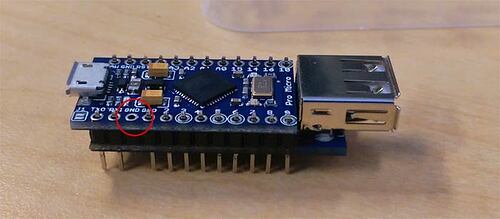Hey Gang-
I have a Pro Micro:
https://learn.sparkfun.com/tutorials/pro-micro--fio-v3-hookup-guide/hardware-overview-pro-micro
Pinout: https://cdn.sparkfun.com/assets/9/c/3/c/4/523a1765757b7f5c6e8b4567.png
NOT TO BE CONFUSED WITH THE PRO MINI:
Pinout: http://i.stack.imgur.com/oOtkU.png
And a USB Host Mini Shield form Circuits @ Home:
Hardware Manual for it:
https://www.circuitsathome.com/usb-host-shield-hardware-manual
The Pro Micro is more or less a Leonardo, with a Pro-Mini footprint.
The differences that I have found so far are:
1.) The RESET pin on the Pro Micro is -not- in the same location as the Pro Mini (not sure why this was done, but it is what it is)..
2.) The SPI pins on the Pro Micro are different than on the Pro Mini as well..
Pro Micro:
MOSI - 16
MISO - 14
SCLK - 15
vs.
Pro Mini:
MOSI - 11
MISO - 12
SCLK - 13
SS - 10
I am using a +3.3v Pro Micro board to connect/communicate with the USB Host Mini Shield....
I performed the mod to get +5v to the VBUS, as well...
And also did a mod to get the RESET pin on the Pro Micro to connect to the RESET pin on the USB Host Mini Shield
There is also the problem? That the Pro Micro does NOT have the SS broken out to the I/O pins along the edges for us to use. The SS pin seems to be connected to the yellow RX led on the board???
*Here is where my problem lies I believe, and need some help understanding things better, and more so, thoughts on a decent solution..
I am using Arduino IDE v1.6.4, and have all the correct board files for the Pro Micro (as I can upload sketches fine).. and have the USB Host Shield 2.0 Lib installed as well..
When I use the Board_qc test sketch...
I getting the following error:
Circuits @ Home: 2011
USB Host Shield Quality Control Routine
Reading Revision Register: Die Revision invalid Value Returned: 00
Unrecoverable error: test halted!
0×55 pattern is transmitted via SPI
Press RESET to restart test
Which according to Oleg (developer of the USB Host shield & Lib), means there is no communication between the USB Host Shield and the Pro Micro..
My question now is, how can I get SPI working on the Pro Micro?
I have done a little searching and am not clear on what to try? (I'd like to avoid any physical mod'ing/cutting of traces etc.. if I can)
Is there a way to turn the default SS pin to output or something? and re-define the pin somewhere in sketch or library?
I find it odd that the Pro Micro basically doesnt allow anyone to use SPI by default without some sort of hack/mod?? (I'm hoping this can be cleared up by someone who has been down this road before and can enlighten me?) setting the pin to some certain state, and then re-defining the SS pin to be used or something?
I hope I have given enough info to garner some responses/help!
thanks!
-xl

